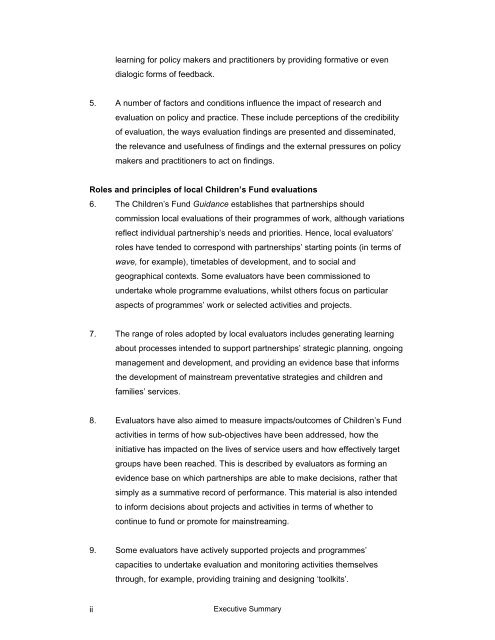Local Evaluation of Children's Services Learning from the Children's ...
Local Evaluation of Children's Services Learning from the Children's ...
Local Evaluation of Children's Services Learning from the Children's ...
- No tags were found...
Create successful ePaper yourself
Turn your PDF publications into a flip-book with our unique Google optimized e-Paper software.
learning for policy makers and practitioners by providing formative or evendialogic forms <strong>of</strong> feedback.5. A number <strong>of</strong> factors and conditions influence <strong>the</strong> impact <strong>of</strong> research andevaluation on policy and practice. These include perceptions <strong>of</strong> <strong>the</strong> credibility<strong>of</strong> evaluation, <strong>the</strong> ways evaluation findings are presented and disseminated,<strong>the</strong> relevance and usefulness <strong>of</strong> findings and <strong>the</strong> external pressures on policymakers and practitioners to act on findings.Roles and principles <strong>of</strong> local Children’s Fund evaluations6. The Children’s Fund Guidance establishes that partnerships shouldcommission local evaluations <strong>of</strong> <strong>the</strong>ir programmes <strong>of</strong> work, although variationsreflect individual partnership’s needs and priorities. Hence, local evaluators’roles have tended to correspond with partnerships’ starting points (in terms <strong>of</strong>wave, for example), timetables <strong>of</strong> development, and to social andgeographical contexts. Some evaluators have been commissioned toundertake whole programme evaluations, whilst o<strong>the</strong>rs focus on particularaspects <strong>of</strong> programmes’ work or selected activities and projects.7. The range <strong>of</strong> roles adopted by local evaluators includes generating learningabout processes intended to support partnerships’ strategic planning, ongoingmanagement and development, and providing an evidence base that informs<strong>the</strong> development <strong>of</strong> mainstream preventative strategies and children andfamilies’ services.8. Evaluators have also aimed to measure impacts/outcomes <strong>of</strong> Children’s Fundactivities in terms <strong>of</strong> how sub-objectives have been addressed, how <strong>the</strong>initiative has impacted on <strong>the</strong> lives <strong>of</strong> service users and how effectively targetgroups have been reached. This is described by evaluators as forming anevidence base on which partnerships are able to make decisions, ra<strong>the</strong>r thatsimply as a summative record <strong>of</strong> performance. This material is also intendedto inform decisions about projects and activities in terms <strong>of</strong> whe<strong>the</strong>r tocontinue to fund or promote for mainstreaming.9. Some evaluators have actively supported projects and programmes’capacities to undertake evaluation and monitoring activities <strong>the</strong>mselvesthrough, for example, providing training and designing ‘toolkits’.iiExecutive Summary
















